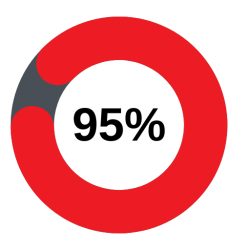As a decision maker for learning and development, new ways to support your workforce are always top-of-mind. This article focuses on an important one, investing in professional development. At MDC, we specialize in communication-skills training because we believe companies are stronger when their employees speak up and share ideas. We love empowering professionals with tools to do so effectively, even on the fly.
Over the years, we’ve witnessed how communication-skills development positively impacts businesses and their employees. But how can you ensure that workplace communication is respectful, timely, and tailored to the audience? By giving people the tools they need to express themselves clearly and quickly. Let’s have a look at how that can happen for your team, but let’s keep it simple.
Explain Like I’m 5 (“ELIM5”)
One of my favourite virtual spaces is the subreddit “r/explainlikeimfive” (ELIM5). This community of 22 million people (and perhaps a few bots) share and consume information about complex subjects in simplified and easy to understand ways. I like it because it embodies two of MDC’s core values and learning mandates: Simplicity and Clarity. In practice, this looks like using less words and avoiding jargon to clearly deliver a message. Albert Einstein once said, “If you can’t explain it simply, you don’t understand it well enough.” I’ll take that challenge! Keep reading to learn the six benefits of communication-skills training for your company. Feel free to leave a comment let me know how I did with the #ELIM5 challenge.
Next Think on Your Feet® Demo (Virtual) August 22: Register Here
WORKPLACE COMMUNICATION: THE GOOD AND THE BAD
What is Good Workplace Communication?
Good workplace communication is clear and succinct. It helps create a positive work environment where open and honest communication is encouraged. Employees feel confident to speak up and know that their voice counts when they do. This involves active listening, paying attention to what others say, and responding, often with no time to prepare. Here’s where things can get tricky. Communication breakdowns can occur when you’re not prepared.
What is Bad Workplace Communication?
Bad workplace communication can range from confusing, vague, or disrespectful to insensitive and even aggressive. It can lead to misunderstandings and negative business impacts. Employees may feel they are not being listened to or valued. So, while good workplace communication can build a productive work atmosphere, the opposite is also true. Bad communication can lead to decreased productivity, frustration, low morale, and conflict.
WHAT IS COMMUNICATION-SKILLS TRAINING?
Most communication training programs focus on more formal situations or “presentation” skills. But our research reveals that most workplace exchanges are unplanned, off-the-cuff, and casual.
Our research shows:

95% of workplace communication is informal (you have no time to prepare)
Examples: Elevator pitch, Q&A session, meetings, status updates, conference calls, board updates, etc.
IS IT WORTH THE INVESTMENT?
Simply put, yes. Workplace learning opportunities for all employees are a vital part of any business strategy. Offering impactful training is part of the answer to “the great resignation” and employee burnout.
SIX BENEFITS OF COMMUNICATION-SKILLS DEVELOPMENT FOR YOUR TEAM
- Enhanced Creativity and Innovation:
Discovering new ideas and ways to approach daily tasks can inspire employees to think beyond the tried-and-true. - Better Teamwork:
Encouraging and facilitating collaborative teamwork ensures everyone is on the same page. - Improved Company Reputation:
By investing in training, companies show that they support their employees, a strong signal of a preferred employer. - Improved Performance:
Enhancing employees’ skills and knowledge can lead to better overall job performance, productivity, and efficiency. “The group that invested more [in training] recorded a 57% increase in sales and a 37% rise in gross profit per employee. ” –American Society for Training & Development - Employee Retention:
Providing opportunities for professional growth and development makes employees feel valued and supported, making them more likely to stay with your company. “At most key decision points, digital workers place as much if not more importance on career development and advancement potential as they do on compensation.”-McKinsey Study 2022 - Increased Job Satisfaction:
Employees are more likely to feel satisfied with their jobs if they believe they are developing professionally. This fosters motivation and engagement in the workplace.
We have worked with Learning and Development professionals for almost 40 years and the truth is: If a company prioritizes communication-skills development as a key part of its talent management strategy, it will create a more skilled, engaged, and motivated workforce, leading to greater success and professional reputation.
Where To Begin?
Click the image below and scroll through our recent post. Which workplace communication challenge are you facing right now? Feel free to send us an email to start your learning journey, we offer free consultations and live previews regularly.

